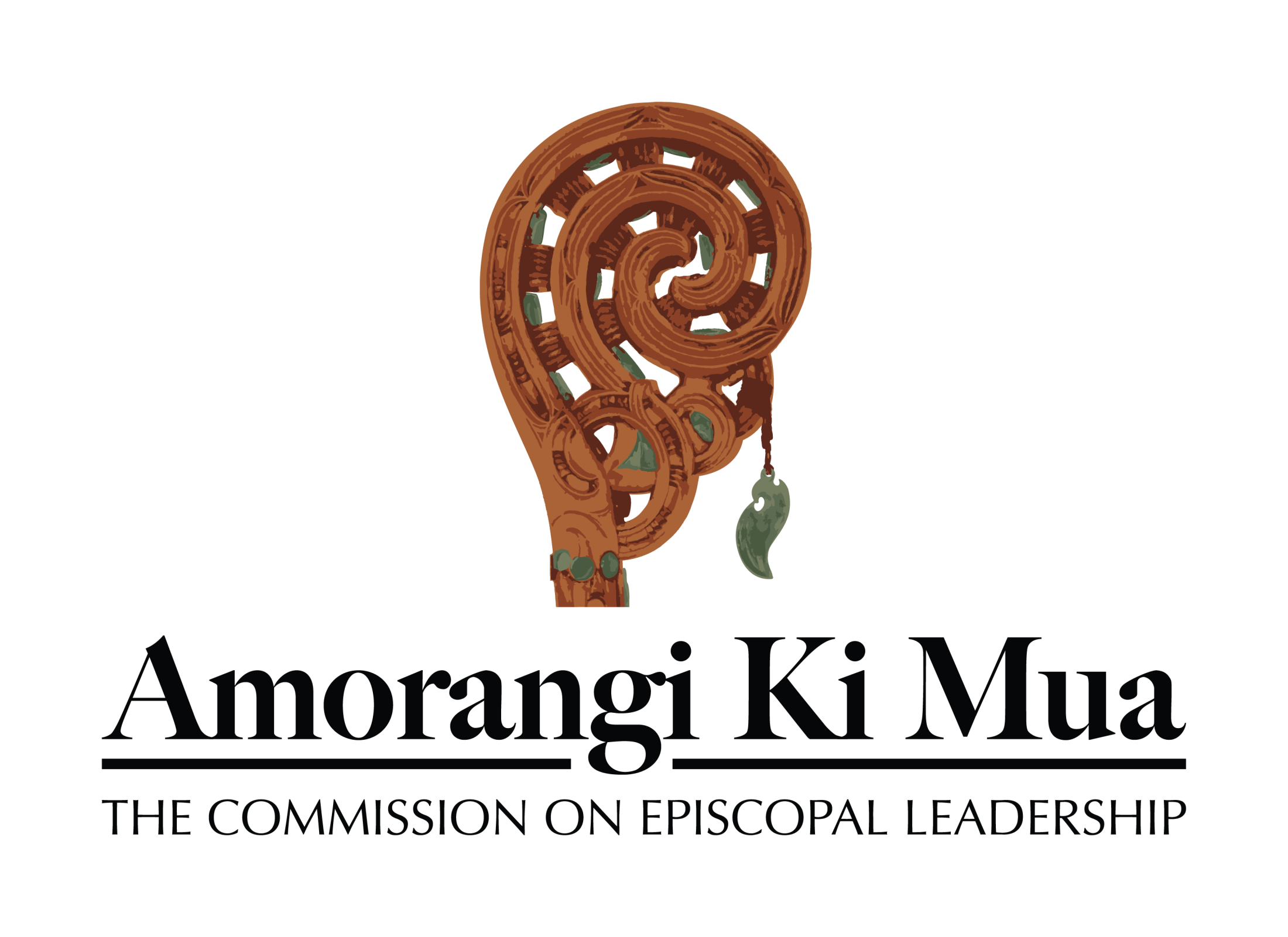A new name and logo have been approved by the Commission on Episcopal Leadership at it’s first meeting held last Friday the 8th of March at St Johns Theological College in Auckland.
The logo is inspired by the late Bishop Richard Wallace’s crozier, which was carved by Ngai Tahu carver Fayne Robinson. Archdeacon Susan Wallace explained that the crozier is named Te Hēpara Pai (the good shepherd) it is adorned with greenstone, including the manaia that hangs from the front. It depicts the trinity and the changing world, coiled around the staff is the bearers whakapapa and connection to their place of birth.
The name Amorangi ki Mua represents the whakatauki (proverb) “Ko te Amorangi ki mua ko te hapai o ki muri.” “Let God be your spearhead and flourishing will follow.” The late Rev. Canon Wi Te Tau Huata famously adapted the whakatauki to a waiata moteatea that is still sung by Ngāti Kahungungu today.
Jhaymean Terekia graphic designer for the Pīhopatanga produced the design and the Commission unainomously accepted the name and the logo for their work ahead.
Chair of the Commission Professor Khylie Quince facilitated the meeting, there was a full turnout of members Deputy Chair Geremy Hema (Ngāti Paoa) welcomed the Commission to the college and opened with prayer. Other members included Sir Selwyn Parata, Dr Emily Colgan, Rev. Liliani Havili, Dr Anne Philips, Pierre Henare, Ven. Michael Tamihere, Ven. Susan Wallace and Rev. Jacynthia Murphy.
The meeting focused on criteria and qualities when selecting a Bishop, Archbishop Emeritus Sir David Moxon reminded us of our biblical and ecclesiological roots as Mihinare (Anglican) Christians and delivered a paper on “The qualities of episcopacy: biblical and Anglican Communion discernment”
Archdeacon Ruihana said, the ordinal and scripture have provided the basis for the ministry of a Bishop, it can often be wrapped up in a lot of rhetoric and interpretation, that we lose sight of the simple logic of that ministry. Archbishop David’s paper helped us to locate some of that simplicity. We need to genuinely examine the parameters (or lack of) our Bishops are working within for the benefit of both the individual and the church.
Chair Khylee Quince invited AUT Chancellor Rob Campbell to speak on criteria and qualities of leaders in today’s world. Rob was a leader in the trade union movement of the 70’s and 80’s, he also built a long career in corporate governance guiding and leading both public and private companies. As the chair of Te Whatu Ora (Health NZ) in 2023 he controversially spoke out about the national parties opposition to the three waters legislation and warned about the likely axing of Te Aka Whai Ora (the Māori Health Authority).
The Commission appreciated Rob’s pragmatic insight and wisdom, he opened by saying “Leadership is defined by those who are led, having a position or title is not leadership, whether you are born to it, earn it, or elected to it.”
Defining goals is essential he said, leadership is not administration or management and it takes insight, courage and influence to change goals.”
Dr Emily Colgan said the comment that stood out for her most was made by Sir Selwyn Parata, “ka rongo koe ki te hā o tou whanau ma reira ka rongo i te hā ou hapū, iwi me te taiao.” “A leader must be imbued and informed by the matauranga of their environment which is beyond just physical knowledge.”
The Commission is tasked with making recommendations to Te Rūnanganui 2025, it is hoped that these recommendations will assist with the way Bishops are elected and supported throughout their tenure in Te Pīhopatanga o Aotearoa. Rev. Liliani Havili Principal of St Johns College in Suva acknowledged the approach of Archbishop Don including representation from Tikanga Polynesia and Pakeha so that the findings of the Commission can potentially have benefits for the whole church.
Last year the Commission engaged Rev. Christina Syratt to do a desktop study of episcopal arrangements across the communion, she looked at constitutions and canons from 15 provinces examining things like entry requirements of a Bishop, length of tenure, support mechanisms, support for women Bishops.
Archdeacon Ruihana said we found that there is no one model that reflects the ACANZP or provides a similar starting point, however there were useful precedence from different provinces. It reinforces that we need to design something new that is fit for purpose.
The next meeting of the Commission will be via zoom followed by an in person hui in July. If you would like to contact chairperson Khylee Quince or the team supporting her with this work you can email .
